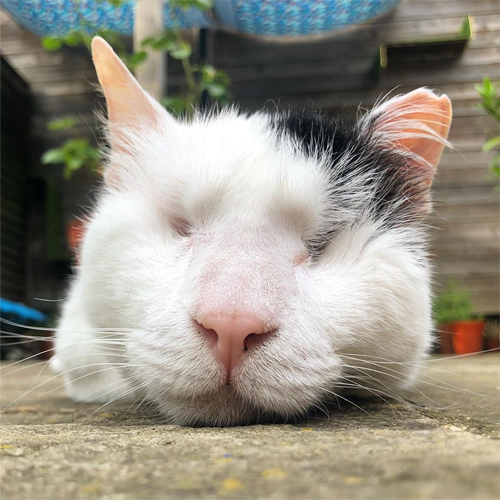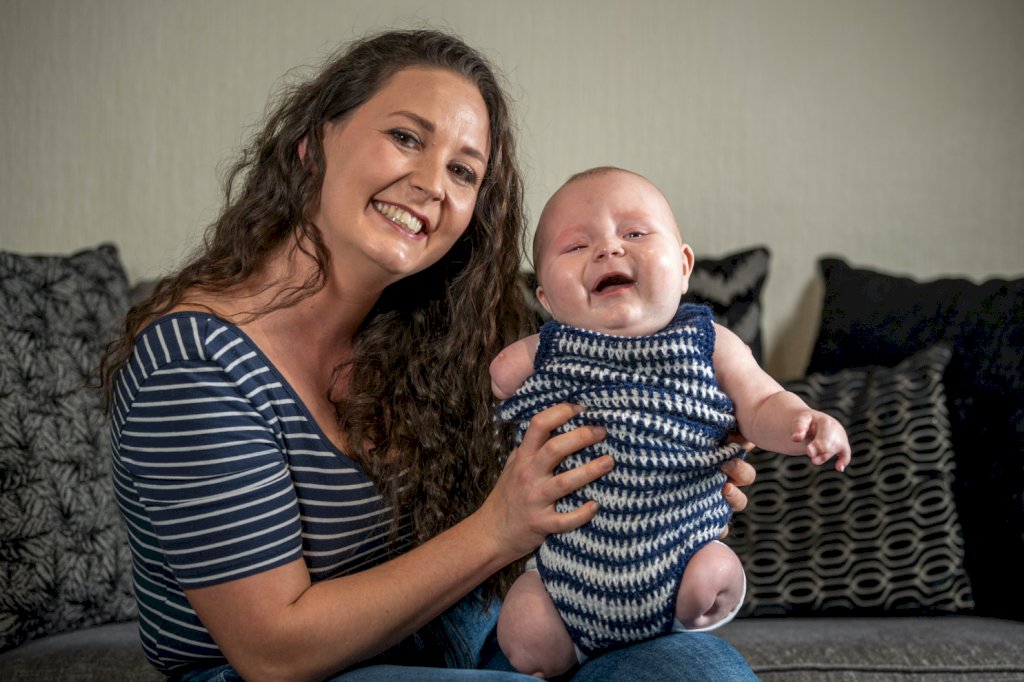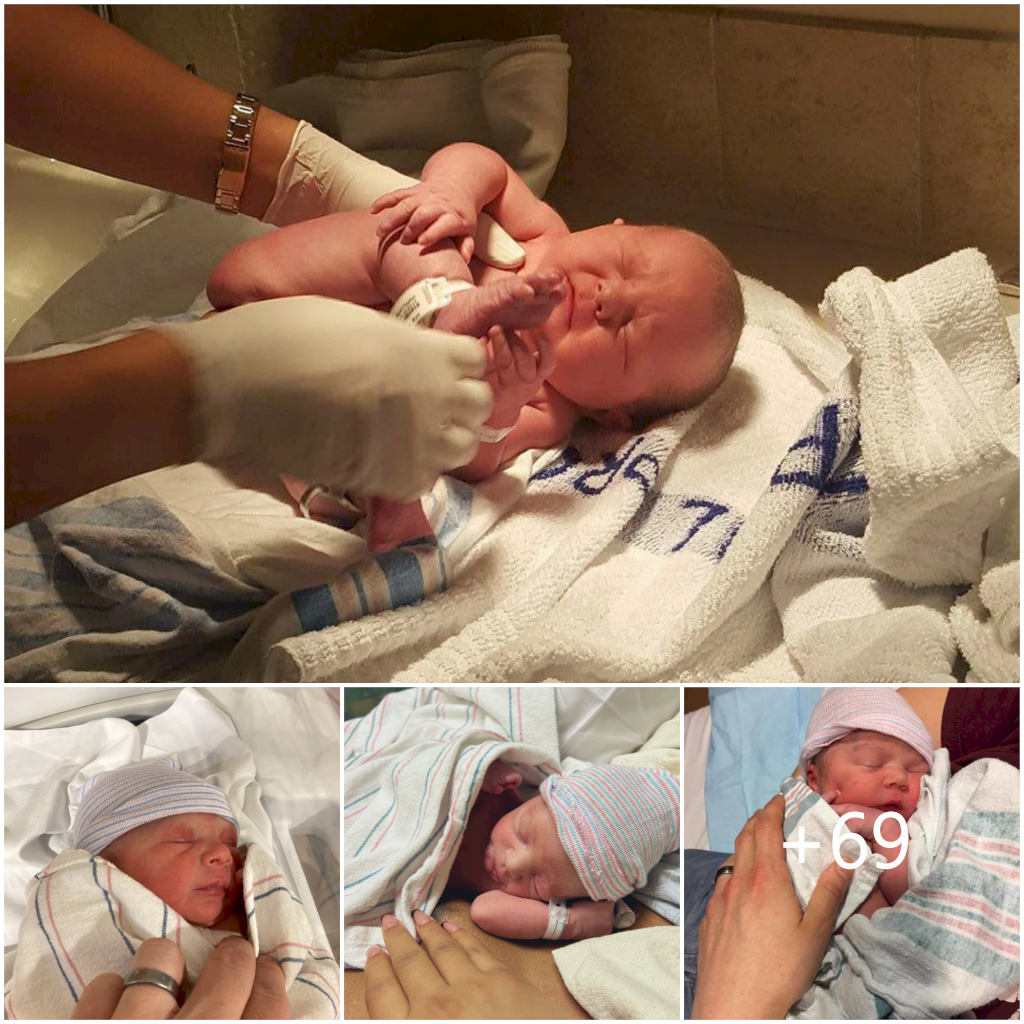When Brittain Bright saw photos on Instagram of Felix, an adorable black and white cat who was suffering from feline calicivirus, in February 2018, she immediately started sharing his story on social media.
“Felix was a street cat in Kuwait, and he was rescued by RAF.KW,” explains Brittain. “I wanted to help raise money for his medical costs, and then I was checking for updates of him all the time.”
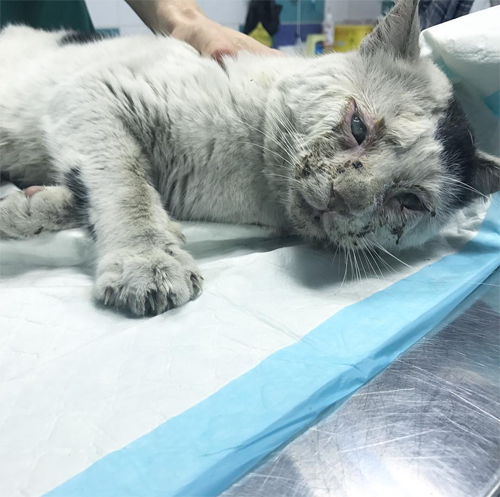
Unfortunately, Felix, who was around a year old when he was rescued in early 2018, had ulcers on his paws, mouth, jaw, and eyes due to feline calicivrius, and the highly contagious infection had caused him to permanently lose his vision.
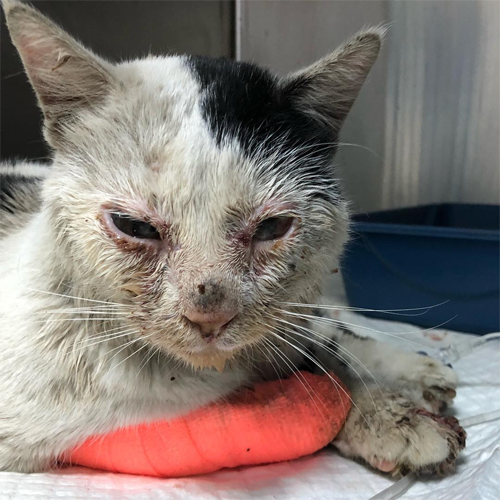
While other people might have been apprehensive about adopting a special needs cat from another country, Brittain was undeterred. “I offered him a forever home just a few days later, as soon as the vets felt reasonably sure he would survive,” remembers Brittain.
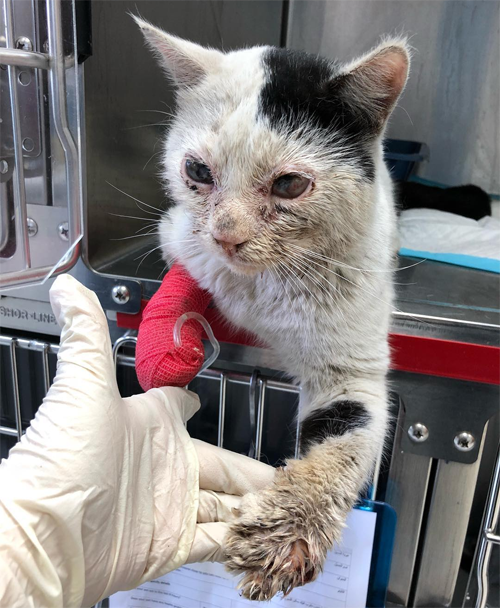
After all, she already had experience caring for a special needs cat, having adopted Orlando, a blind kitten, several years earlier. “He was a heroic little one!” says Brittain. “He sadly developed FIP [feline infectious peritonitis, a viral disease that is often fatal] and died, but he taught me to love special needs cats, and to see that they can compensate beautifully. I learned from Orlando that blind cats can do almost everything that sighted cats can do.”
While Brittain’s adoption application was approved, she had to wait until Felix was healthy enough to travel to her home in England. Not only did the handsome rescue cat have to recover from feline calicivirus, he also had to recover from the surgery he had to remove both of his eyes. “The vets decided that removing his eyes would relieve his pain,” says Brittain. “He had a few scares after his surgeries, but he pulled through.”
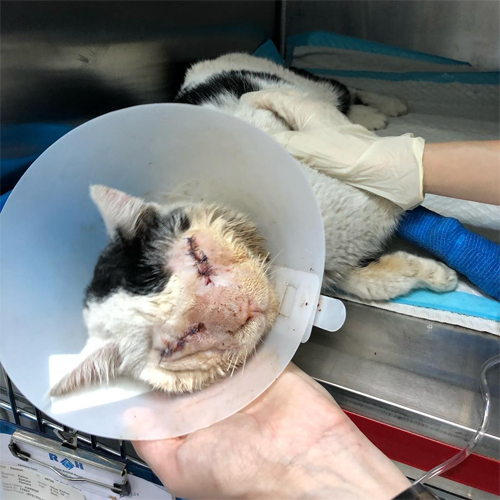
Even though Felix was well enough to make the journey to the England, the UK government required him to have certain vaccinations and to observe multiple waiting periods. Consequently, this adorable black and white feline was placed in three different foster homes while RAF.KW worked to make sure Felix satisfied the guidelines set out by the UK government. “The rescue put me in touch with all of his kind foster parents, and they shared regular updates with me,” says Brittain.
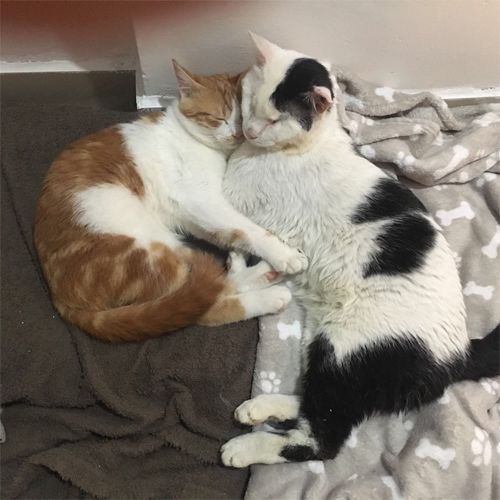
Ten months after Brittain saw Felix’s face on social media for the first time, he was finally allowed to travel to his new home in England, and she collected him from Heathrow Airport in December 2018. In order to help Felix adjust to his new environment, Brittain initially kept the sweet special needs cat in a small space, but it wasn’t long before he was eager to explore.
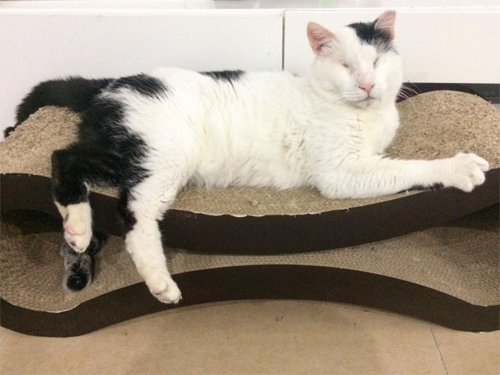
“He was pushing to get out of his isolation bathroom within a couple of days!” remembers Brittain. “When he first began exploring our house, he was afraid to go down the stairs, even though he always wanted to go up!”
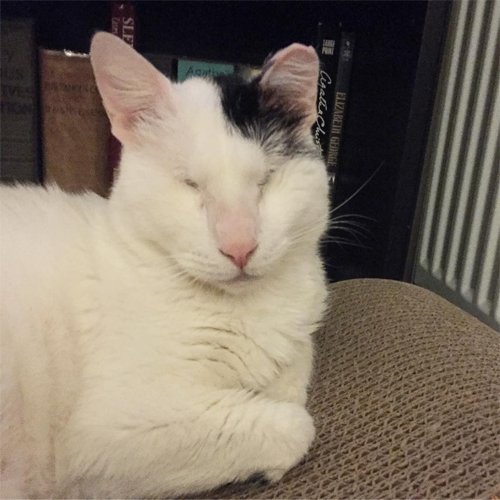
In order to help Felix become more confident about descending the staircase, Brittain used cardboard to block off the spaces between the banisters, giving this curious blind feline a guide to use on his way down the stairs. “He quickly learned how it’s done!” says Brittain, and more than a year later, Felix, who has significant nerve damage on one side of his body, has no trouble getting around his family’s home. “Now he even likes to play on the stairs!”
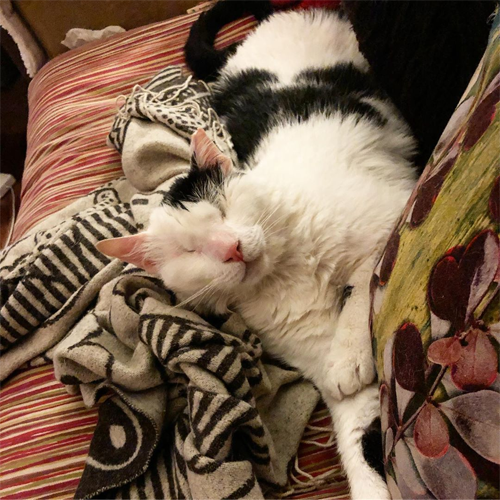
Felix also enjoys napping with Teddy, his adoptive feline brother, playing games of chase with the cats and people who share his home, walking on his wheel (but only in exchange for treats), and playing with tissue paper and balloons.
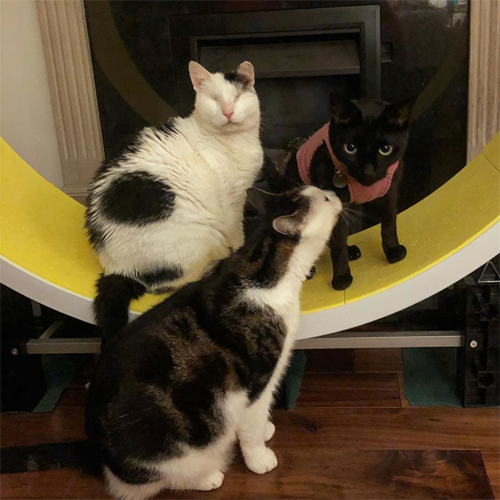
He also enjoys spending supervised time in his family’s enclosed backyard, but only when it’s warm and dry. “He’s a desert cat who can’t stand the cold and rain,” says Brittain. “He adores listening to birds, especially when they fly over the garden or flap in the trees nearby — he seems to think he could catch one, if only he could fly!”
While Felix may not be able to fly, he is able to jump, which comes as a surprise to a lot of people who assume blind cats are less agile and coordinated than their sighted counterparts. “He is fine jumping on sofas and chairs,” explains Brittain, “But he only jumps to a specific height [due to his nerve damage.]” Consequently, Brittain made Felix a footstool to help him get onto the bed at night, allowing this sweet and affectionate boy to engage in another one of his favorite activities: snuggling with his mom.
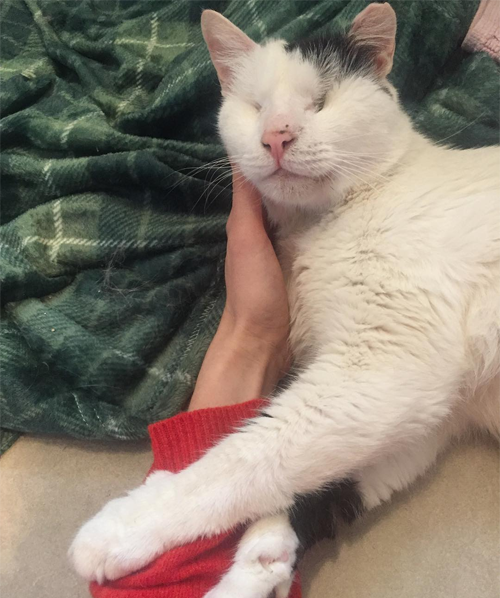
Without a doubt, Brittain and Felix have a very special bond, but she’s not the only person he enjoys spending time with, showing most blind cats aren’t shy and timid like people often assume. “Felix is really social,” says Brittain. “When anyone visits, even the vet, he comes to sniff and greet them, and he always wants to be in the middle of whatever is going on.”
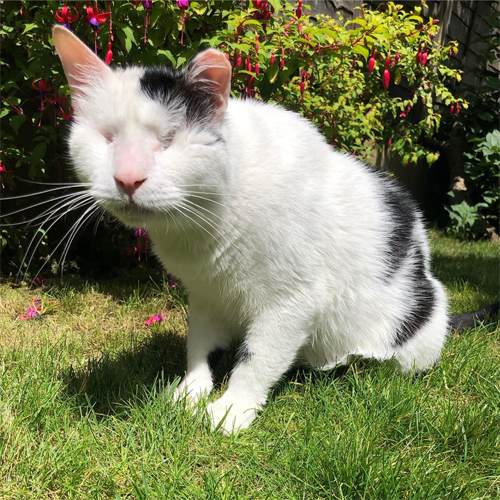
While he may not be able to see, Felix uses his other senses to navigate and understand his environment. “I don’t think I understood the control a cat has over his whiskers until I saw Felix pointing his straight forward to guide him,” says Brittain, who has witnessed this completely blind cat follow a butterfly all around the garden of his family’s home. “Like all cats, he can hear a treat bag from the other end of the house, and he comes running.”
Thanks to his mom, Felix’s multiple foster parents, and the incredible people at RAF.KW, this former street cat’s life is filled with treats and fun, and Brittain hopes more people will consider opening their homes to animals with special needs. After all, while it took ten months for her to finally meet Felix in person, Brittain is confident this incredibly special boy was more than worth the wait.
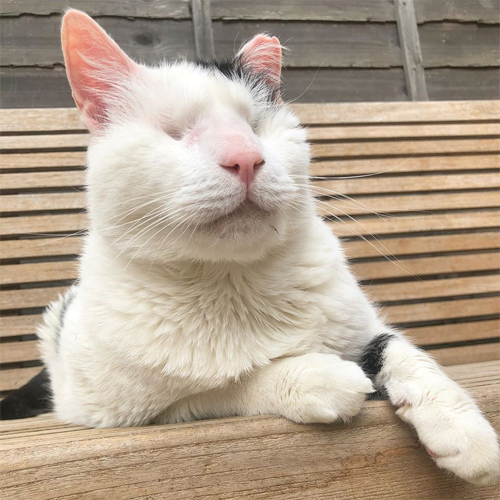
“I just knew he belonged with me, and he now knows it too,” says Brittain, who loves when Felix greets her at the door when she comes home and follows her around the house. “His trust is so rewarding. I could see Felix’s personality even early on; he is a loving, gentle boy. But when he came home, he got increasingly more confident and sassy, and now he is his full glorious self.”
